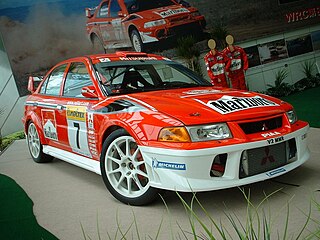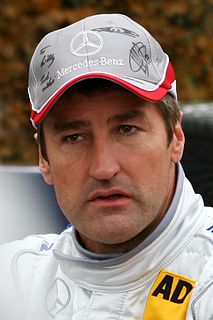
Touring car racing is a motorsport road racing competition with heavily modified road-going cars. It is popular in Argentina, Australia, New Zealand, Brazil, Britain, Germany, Sweden and Denmark. It has both similarities to and significant differences from stock car racing, which is popular in the United States.

Group A was a set of motorsport regulations introduced by FIA covering production-derived vehicles intended for outright competition in touring car racing and rallying. In contrast to the short-lived Group B and Group C, the Group A referred to production-derived vehicles limited in terms of power, weight, allowed technology and overall cost. Group A was aimed at ensuring numerous privately owned entries in races.
The Deutsche Tourenwagen Masters is a grand touring car series sanctioned by ITR e.V. who have been affiliated to the DMSB-FIA since 1984. The series is based in Germany, with rounds elsewhere in Europe. The series currently races a modified version of Group GT3 grand touring cars, replacing the Class 1 touring cars of earlier years.

Throughout its history, BMW cars and motorcycles have been successful in a range of motorsport activities. Apart from the factory efforts, many privateer teams enter BMW road cars in touring car racing. BMW also entered cars or provided engines in Formula One, Formula Two and sportscar racing. BMW is currently active in ALMS, the World Touring Car Championship (WTCC), the Isle of Man TT, the North West 200, the Superbike World Championship and the Deutsche Tourenwagen Masters.

Uwe Alzen is a German racing driver specialised in touring car racing and sports car racing.

Roland Asch is a race car driver from Ammerbuch, near Stuttgart. Asch was a distinctive figure on the German motor racing scene in the 1990s.
Super Touring, Class 2 or Class II was a motor racing Touring Cars category defined by the Fédération Internationale de l'Automobile (FIA) for national touring car racing in 1993. It was based on the "2 litre Touring Car Formula" created for the British Touring Car Championship (BTCC) in 1990. The FIA organised a World Cup for the category each year from 1993 to 1995, and adopted the term "Super Tourer" from 1995.
The Deutsche Tourenwagen Meisterschaft was a touring car racing series held from 1984 to 1996. Originally based in Germany, it held additional rounds elsewhere in Europe and later worldwide.

Schnitzer Motorsport is a motorsport team based in Freilassing near Munich, Germany. From the early days of its establishment, the team has operated an automobile racing squad for BMW, and has remarkable results in touring car and sports car racing scenes. The team often runs the cars for BMW under the name of "BMW Motorsport". In 2012, the team operated the DTM team for BMW under the name of "BMW Team Schnitzer".

During its history, Alfa Romeo has competed successfully in many different categories of motorsport, including Grand Prix motor racing, Formula One, sportscar racing, touring car racing and rallies. They have competed both as a constructor and an engine supplier, via works entries and private entries. The first racing car was made in 1913, three years after the foundation of A.L.F.A., the 40-60HP had 6 liter straight-4 engine. Alfa Romeo quickly gained a good name in motorsport and gave a sporty image to the whole marque.

The 2000 Deutsche Tourenwagen Masters was the fourteenth season of premier German touring car championship and also first season under the moniker of Deutsche Tourenwagen Masters since the original series' demise in 1996. Nine events were held with two 40-minute races at each racing weekend.
The 1996 International Touring Car Championship was the thirteenth season of premier German touring car championship and also only first and final season under the moniker of International Touring Car Championship. It was for FIA Class 1 Touring Cars and it was contested by Mercedes-Benz, Alfa Romeo and Opel. It was formed of the Deutsche Tourenwagen Meisterschaft series that ran both a short German & International-based series in 1995. These were fused together to form the International Touring Car Championship. The eventual champion was Manuel Reuter driving an Opel Calibra, and Opel won the manufacturer's championship.

The 2010 Deutsche Tourenwagen Masters was the twenty-fourth season of premier German touring car championship and also eleventh season under the moniker of Deutsche Tourenwagen Masters since the series' resumption in 2000. The season began on 25 April at the Hockenheimring, and ended on 28 November at the Shanghai Street Circuit, after eleven rounds held in Germany, Spain, the Netherlands, the United Kingdom, Italy and China. Having finished second in 2008 and third in 2009, HWA Team's Paul di Resta became champion for the first time, having come out on top of a three-way title battle in Shanghai.
Laurent Aïello is a French former race car driver, most notable for winning the 24 Hours of Le Mans in 1998, the British Touring Car Championship (BTCC) in 1999, and the Deutsche Tourenwagen Masters (DTM) series in 2002.

The 2018 Deutsche Tourenwagen Masters was the thirty-second season of premier German touring car championship and also nineteenth season under the moniker of Deutsche Tourenwagen Masters since the series' resumption in 2000. 2018 would be the final season for the traditional 4.0-litre V8 naturally-aspirated engine package that debuted in the inaugural reborn season; as the brand new engine package has been introduced for the following season as part of the "Class One Project" prospect with Japanese Super GT GT500 cars. 2018 also marked the final season for Mercedes-AMG in DTM due to Mercedes-AMG departing to FIA Formula E from the 2019–20 season and thus ended its 19 year participation.

The 2019 DTM was the thirty-third season of premier German touring car championship, first season under "Class 1" regulations era and also twentieth season under the moniker of DTM since the series' resumption in 2000. Mercedes-AMG withdrew from the championship after the 2018 season to focus on their Formula E entry. British sports car manufacturer Aston Martin replaced Mercedes-Benz, which marked the first non-German entry in 23 years when Italian car manufacturer Alfa Romeo last entered the series under the International Touring Car Series name in 1996. Defending champion Gary Paffett did not return to defend his title, as he moved to Formula E.

The 2019 Super GT Series was a motor racing championship based in Japan for grand touring cars. The series is sanctioned by the Japan Automobile Federation (JAF) and run by the GT Association (GTA). It was the twenty-seventh season of the Japan Automobile Federation Super GT Championship which includes the All Japan Grand Touring Car Championship (JGTC) era and the fifteenth season the series has competed under the Super GT name. It was the thirty-seventh overall season of a national JAF sportscar championship dating back to the All Japan Sports Prototype Championship. The season began on April 14 and ended on November 24, after 8 championship races & 2 non-championship races.

The 2020 Deutsche Tourenwagen Masters was the thirty-fourth season of premier German touring car championship and also twenty-first season under the moniker of Deutsche Tourenwagen Masters since the series' resumption in 2000 as well as second and final season of "Class One" regulations era.

The 2021 Deutsche Tourenwagen Masters is the thirty-fifth season of premier German touring car championship and also twenty-second season under the moniker of Deutsche Tourenwagen Masters since the series' resumption in 2000.

The 2019 DTM Hockenheim Final is a motor racing event for the Deutsche Tourenwagen Masters held between 5 and 6 October 2019. The event, part of the 33rd season of the DTM, was held at the Hockenheimring in Germany.






















